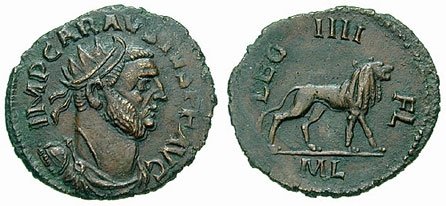The way some commentators are carrying on you would think Brexit was an unusual business.
But actually rejection of continental Europe is a recurring motif in British history. Every so often the British get fed-up with Europe and opt for "Splendid Isolation".
Here is a look back at the previous Brexits
The revolt of 289 AD
Britain had been conquered by the Roman Empire in AD 43, by the Emperor Claudius. But unlike other parts of the Empire, the Britons did not settle down obediently. There were a series of revolts, starting with Boudicca in AD 61, when she went on a rampage, burning Roman cities to the ground, including London (archaeologists have discovered a thick layer of charred ash underneath the City of London, which they call the "Boudicca layer" because everything is so charred that there is even evidence of melted Roman glass).
The Romans responded to this insurbordination by building Hadrian's wall and turning Northern England into a militarised zone. About a quarter of Rome's armed forces were permanently stationed in Britain, and the only reason the Romans persisted in this expensive endeavour is because Britain had a lot of tin and gold, which were vital to the Roman economy (the only other place you could get tin was Afghanistan, which the Romans didn't control).
The most successful revolt came in AD 289. A celtic Briton named Carausius rose through the ranks of the Roman navy, to become admiral of the fleet. And as Admiral he helped the Emperor Maximian to win a battle in Gaul. However Maximian turned on him, accusing him of corruption.
Carausius responding by declaring indendence and naming himself as the true Emperor of Britannia. He succeeded because the Britons enthusiastically followed and supported him.

The first thing he did was issue some proper silver coins (the first proper silver coins people had seen in centuries as Roman coinage had become debased). Some of the coins said things like Restitutor Britanniae (Restorer of Britain) and Genius Britanniae (Spirit of Britain).
As we shall see, the soundness of money is a recurring theme in Britain's Brexits.
Carausius and his successor Allectus held out till AD 296, when Rome conducted a succesful reinvasion of Britain. But the Romans didn't last long - they had gone by AD 410, pulling troops back to Rome as the empire collapsed.
The Tudor Brexit
The next break with Continental Europe came under Henry VIII. He famously broke away from Rome, established the Church of England, and then voluntarily passed power to Parliament to get them to back him against the Europeans (Parliament was thrilled and enthusiastically legislated to dissolve the monastries and remove church privileges so that there was only one law in the land).
Here we encounter a second major Brexit theme - sovereignty and the rejection of foreign courts. (The Roman Catholic church had insisted that clergy were subject only to canon law made in Rome, and this had been a sore point in Britain since Henry I as often priests would commit crimes (including murder) and be exempt from English Common law, with it's trial by jury, and instead were subject to a Catholic court that was inclined to dismiss all charges).
Henry VIII's reign is the point when Britain's south coast was converted into a series of defensive naval ports, to fend off invasions.
The continentals at first held out hope that Britain would change it's mind, especially during the short reign of Mary I. But Edward VI and Elizabeth I stubbornly held out, and at last the Pope excommunicated Elizabeth and invited the rest of Europe to invade Britain to bring them to heel. In addition to threats of invasion, there was a blockade on Britain, preventing her from trading with Continental Europe (this was meant to impoverish Britain and make her come crawling back).
Elizabeth responded by reaching out to the Islamic world. She sent emissaries to Sultan Murad III who ruled the Ottoman Empire, as well as to the Shah of Iran and the Sultan of Morocco. The Islamic world was intrigued by her - here was someone who agreed with them that idolotary was bad, and her protestants were fighting their enemy, the Catholics of Spain. As a result, Elizabeth was successful. As the NYTimes says:
In the 1580s she signed commercial agreements with the Ottomans that would last over 300 years, granting her merchants free commercial access to Ottoman lands. She made a similar alliance with Morocco, with the tacit promise of military support against Spain.
Britain bought silks, sugar, spices and pearls from the Islamic world. New words such as "candy" and "turquoise" (from Turkish stone) entered the language.
In return the English sold the Islamic world weapons. This is something that has continued - Britain still sells former Ottoman countries like Saudi a lot of weapons.
During this period Elizabeth authorised the setting up of trading companies: the Muscovy Company, which traded with Persia, the Turkey Company, which traded with the Ottomans, and the East India Company, which traded with India.
This Brexit laid the foundation of the British Empire.
Part II will be published tomorrow